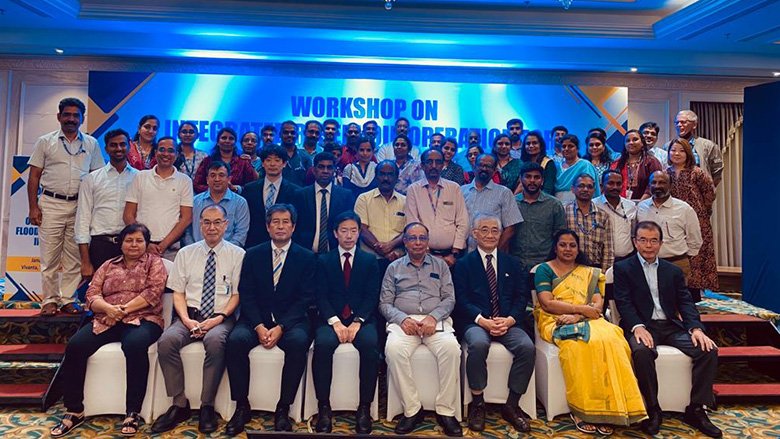From January 23-25, 2023, the GFDRR Japan-World Bank Program for Mainstreaming Disaster Risk Management in Developing Countries (the Japan Program) and the World Bank Kerala Water Project team hosted a Scoping Workshop in Kerala, India to discuss and visualize the proposal for evolving integrated river basin management in Kerala and to develop reservoir operation policies that incorporate the impact of climate change.
There has been a consensus that the basins of short, steep, and seasonally fed rivers of Japan subject to frequent flooding are in many ways identical or similar to the river basins of Kerala and the models and tools used there can be modified and applied in Kerala.
Therefore, this workshop provided an opportunity for officials and stakeholders in India to collaborate with Japanese experts on applications of the Japanese techniques and institutional mechanisms in Kerala.
Dr. Toshio Koike, the Executive Director of Japan’s International Centre for Water Hazard and Risk Management (ICHARM), and other experts from ICHARM brought their esteemed academic analyses of river basin management to the workshop while Mr. Nobuyuki Ichihara, Director of the Japan Water Agency (JWA) and other experts from JWA presented the invaluable practitioner’s perspective.
Dr. Koike shared Japanese experiences and approaches relevant to Kerala including highlighting the similar water challenges experienced by both Japan and Kerala and how Japanese approaches such as proper understanding of the roles of dams, rainfall monitoring, daily operation policies, systems framework and institutional and risk communication mechanisms would help to mitigate risks in Kerala.
Mr. Nobuyuki Ichihara highlighted examples of flood control dams in Japan and gave a vivid picture of the upgradation project for climate change. He also presented case studies on flood control by dams during the Hagibis typhoon and on the emergency spillway gate operation of Kusaki dam.
Another Japanese expert from JWA, Mr. Kazumi Sasaki, presented about the practical applications of the integrated operation of dam systems in Japan, highlighting the methodology used for the Yoshiro River system as it is applicable to river basins in Kerala.
Next, Dr. Tomoki Ushiyama from ICHARM shared details about the operation supporting system for hydroelectric dams to improve flood control and power generation. He also presented the importance of ensemble runoff prediction and estimation of inundation downstream. The case study for the Takahashi River was presented as well as a demonstration of highlights from the ensemble forecast.
Finally, Dr. Abdul Wahid Mohamed Rasmy from ICHARM emphasized the importance of rainfall networks and monitoring systems. He presented the results of a flood forecasting model attempted for the Chalakudy basin.
This Phase I Scoping Workshop was a successful start to the larger project envisioned—Phase II, a scenario assessment for the Integrated River Basin—which focuses on the preparation of plans for integrated river basin management including studies, modeling and forecasting considering the impact of climate change that will inform updating institutional mechanisms and policy frameworks in Kerala. The Government of Kerala will continue engaging Japanese experts from ICHARM and JWA for technical support for both the project proposal and execution of the study. Phase II will also leverage larger, ongoing World Bank projects in Kerala such as the Dam Rehabilitation and Improvement Project (DRIP) also supported by the Japan Program.
